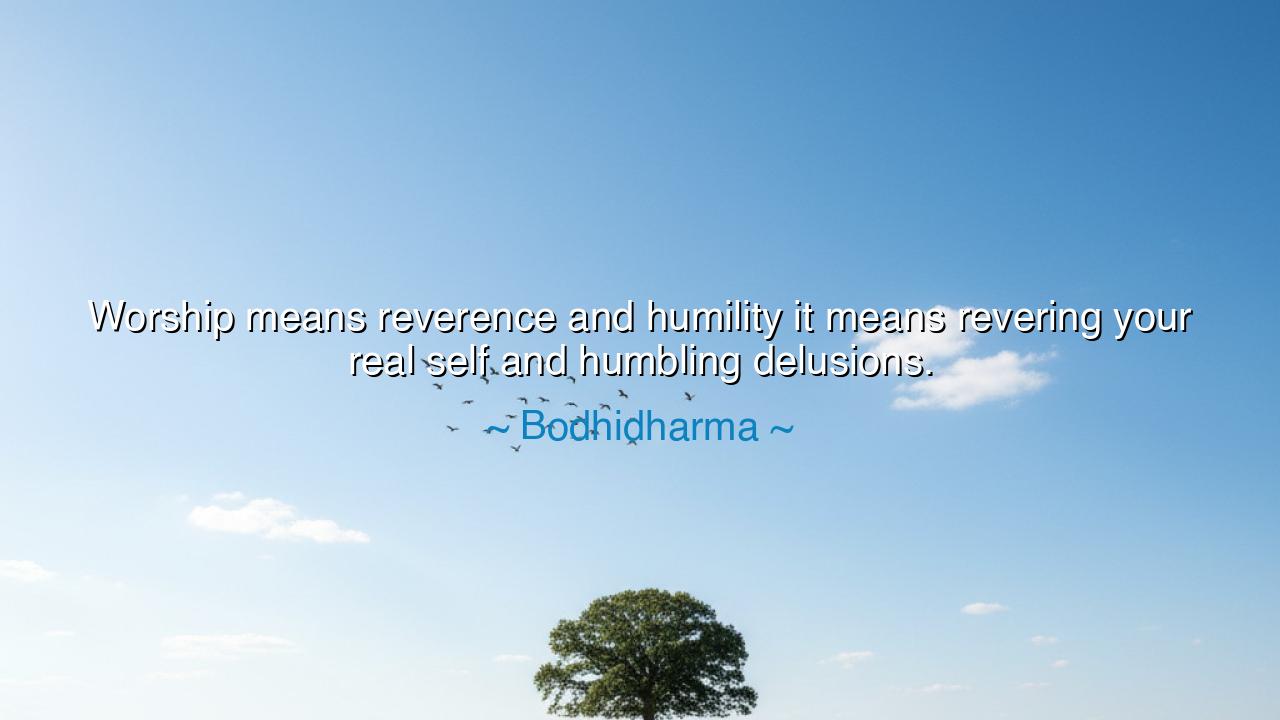
Worship means reverence and humility it means revering your real
Worship means reverence and humility it means revering your real self and humbling delusions.






“Worship means reverence and humility; it means revering your real self and humbling delusions.” Thus spoke Bodhidharma, the wandering sage from the East — the founder of Zen, the master who brought the seed of awakening from India to China. His words, like the wind over still water, stir the soul into reflection. In them lies a mystery that only the quiet heart can grasp: that true worship is not the bowing before an idol or the chanting of sacred names, but the deep reverence for truth within oneself, and the fearless humbling of illusion that clouds the mind.
Bodhidharma lived in the sixth century, a time when spiritual practice had become tangled in ritual and doctrine. He crossed rivers and mountains not to teach men to pray louder, but to help them see clearer. His quote was born out of rebellion against hollow piety — against those who mistook devotion for ceremony, and enlightenment for words. To him, the greatest temple was not made of stone but of consciousness, and the truest offering was not incense, but self-awareness. Thus he said that to worship rightly is to revere the real self, that divine nature untainted by ego, fear, or falsehood.
What is this “real self” of which he speaks? It is not the mask one wears before the world — not the roles, the names, the ambitions — but the still and radiant center of being that lies beneath. It is the soul that observes without pride, loves without possession, and lives without fear. To revere that self is to honor the divine spark that dwells within all life. It is to look inward and see that the truth one seeks in gods, scriptures, and heavens already burns quietly in the depths of one’s own heart. Bodhidharma teaches that reverence begins with recognition — that we are not creatures of craving and confusion, but fragments of the infinite seeking to awaken to themselves.
Yet, reverence alone is not enough. For the path to enlightenment is not paved with praise, but with humility. To humble one’s delusions — that is the other half of Bodhidharma’s teaching. The delusions he speaks of are not fantasies alone, but the deep-rooted falsehoods that bind the human soul: the belief in separateness, in superiority, in permanence. These illusions make the ego king and the spirit servant. When man worships his own image, when he clings to his desires and fears, he loses sight of truth. True worship, then, is the act of unmasking — the surrender of falsehoods, the letting go of pride, until only the real remains.
Consider the example of Prince Siddhartha, who would later become the Buddha. He lived surrounded by luxury, praised as divine by those around him, yet his heart was restless. Surrounded by illusions of comfort and control, he saw that none of it was real. He left his palace, not to escape the world, but to humble the delusions that blinded him. Through years of struggle, meditation, and silence, he discovered that enlightenment lay not in denial of self, but in awakening to one’s true nature, free of ego. His life mirrors Bodhidharma’s teaching — for his worship was not of form, but of truth, and his humility was not weakness, but liberation.
Bodhidharma’s wisdom pierces the heart of all religion. It reminds us that spirituality without inner transformation is emptiness. To kneel in prayer while the mind is full of arrogance is not worship, but performance. To chant holy words while despising one’s neighbor is not reverence, but deceit. The sacred act is not what the body does, but what the soul becomes. Worship, in its highest form, is the harmonizing of the human and the divine within oneself — the moment when illusion bows before truth, and the heart stands still in awe of what it already is.
So, my child, take this teaching into your own life. Do not seek holiness in temples alone, nor in the praises of men. Seek it in the quiet work of self-honesty. When you pray, do not ask for favor; ask for clarity. When you act, do so with humility, remembering that the same breath that animates you animates all beings. And when you look inward, do not fear what you find — for beneath the noise of delusion lies the real self, calm, radiant, and eternal. Worship that, and you will need no other gods.
In the end, Bodhidharma’s teaching is both fire and mirror — it burns away pretense and shows us who we are. To worship truly is to awaken. To awaken is to see the divine not as something apart, but as the very essence of one’s being. The man who learns this will not need temples or titles; his every breath will be a prayer, his every act a hymn. For when reverence meets humility, when the real self rises and the false self falls, then — and only then — does the soul stand in perfect worship before eternity.






AAdministratorAdministrator
Welcome, honored guests. Please leave a comment, we will respond soon